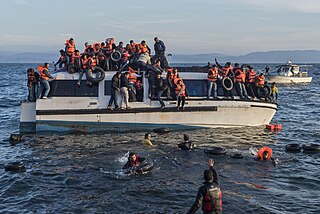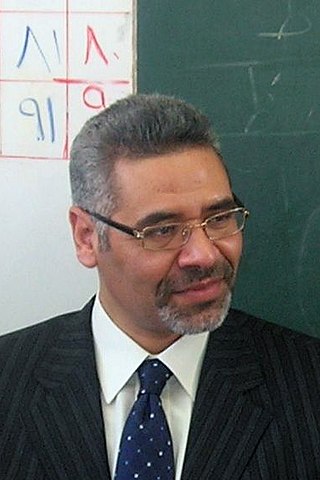Related Research Articles

Human migration is the movement of people from one place to another, with intentions of settling, permanently or temporarily, at a new location. The movement often occurs over long distances and from one country to another, but internal migration is the dominant form of human migration globally.

Forced displacement is an involuntary or coerced movement of a person or people away from their home or home region. The UNHCR defines 'forced displacement' as follows: displaced "as a result of persecution, conflict, generalized violence or human rights violations".

Immigration is the international movement of people to a destination country of which they are not usual residents or where they do not possess nationality in order to settle as permanent residents. Commuters, tourists, and other short-term stays in a destination country do not fall under the definition of immigration or migration; seasonal labour immigration is sometimes included, however.
African immigrants in Europe are individuals residing in Europe who were born in Africa. This includes both individuals born in North Africa and Sub-Saharan Africa.
Opposition to immigration, also known as anti-immigration, is a political ideology that seeks to restrict immigration. In the modern sense, immigration refers to the entry of people from one state or territory into another state or territory in which they are not citizens. Illegal immigration occurs when people immigrate to a country without having official permission to do so. Opposition to immigration ranges from calls for various immigration reforms, to proposals to completely restrict immigration, to calls for repatriation of existing immigrants.

Ayman Zohry is a demographer/geographer and expert on migration studies based in Cairo, Egypt. He was born in Souhag, Egypt. Zohry received his Ph.D. from the University of Sussex in 2002. He is a leading researcher in the field of migration studies in Egypt with a special focus on irregular migration.
The Refugee Studies Centre (RSC) was established in 1982, as part of the University of Oxford's Department of International Development, in order to promote the understanding of the causes and consequences of forced migration and to improve the lives of some of the world's most marginalised people. Its philosophy is to "combine world-class academic research with a commitment to improving the lives and situations for some of the world's most disadvantaged people".

The Oxford Department of International Development (ODID), or Queen Elizabeth House (QEH), is a department of the University of Oxford in England, and a unit of the University’s Social Sciences Division. It is the focal point at Oxford for multidisciplinary research and postgraduate teaching on the developing world.
It is difficult to measure how many people reside in the UK without authorisation, although a Home Office study based on Census 2001 data released in March 2005 estimated a population of between 310,000 and 570,000. The methods used to arrive at a figure are also much debated. Problems arise in particular from the very nature of the target population, which is hidden and mostly wants to remain so. The different definitions of 'illegality' adopted in the studies also pose a significant challenge to the comparability of the data. However, despite the methodological difficulties of estimating the number of people living in the UK without authorisation, the residual method has been widely adopted. This method subtracts the known number of authorised migrants from the total migrant population to arrive at a residual number which represents the de facto number of illegal migrants.
Institute for the Study of International Migration is a private research institute located in Washington, DC. Founded in 1998 as part of Georgetown University's School of Foreign Service, it is associated with the Georgetown University Law Center. The Institute for the Study of International Migration (ISIM) is an innovative multidisciplinary center that studies the social, economic, environmental, and political dimensions of international migration.
Migration studies is the academic study of human migration. Migration studies is an interdisciplinary field which draws on anthropology, prehistory, history, economics, law, sociology and postcolonial studies.
The Migration Observatory at the University of Oxford is a project providing analysis of immigration and migration issues affecting the United Kingdom. It is a part of the Oxford University's Centre on Migration Policy and Society (COMPAS) and was launched in March 2011 with the broad aim of improving public discourse on migration in the UK by looking at key migration issues. They break this mission into two parts: one part of their mission is "to inform media, public and policy debates" while a second part is "to generate high quality research on international migration and public policy issues".

International Management Institute (IMI) Kolkata is a private business school located in Kolkata, India. It was founded in 2010. The Institute started its operation in 2011 with its flagship Post Graduate Diploma in Management Programme accredited by the National Board of Accreditation (NBA). The first group of students at IMI Kolkata graduated in the year 2013. Campus placements at IMI Kolkata increased in the year 2014. In 2017, the Institute obtained the approval from All India Council for Technical Education to launch the Fellow Programme in Management (FPM), a Ph.D. level programme. IMI Kolkata's two-year full time PGDM programme is also accorded equivalence with Master of Business Administration (MBA) Degree by the Association of Indian Universities (AIU).
Superdiversity, or super-diversity, is a social science term and concept often said to have been coined by sociologist Steven Vertovec in a 2007 article in Ethnic and Racial Studies, but which he first used in a BBC article in 2005.
Jan Rath is a Dutch social scientist who is holding a chair in Urban Sociology in the University of Amsterdam, the Netherlands. His academic studies have focused on the nexus of urban structures and processes on the one hand and their social, ethnic and religious dimensions on the other. His work is highly cited in the sub-fields related to the problematization of immigrant ethnic minorities, and on urban economies, entrepreneurship, and cultural consumption.

Gibril Faal OBE is a British-Gambian business and development executive. In 2014, he was appointed OBE in the Queen's Birthday Honours List for services to international development, following a nomination by the Department for International Development (DfID). He is a visiting professor in practice at London School of Economics. He was one of the global leaders who spoke at the 19 September 2016 UN Summit on Refugees and Migrants, joining select presidents, prime ministers and institution leaders to address the question of 'International cooperation'. Gibril serves as technical expert in the consultations and negotiations for the Global Compact on Migration. He was the Grand Rapporteur of the Tenth Summit of the Global Forum on Migration and Development (GFMD) in Berlin in June 2017. He co-moderated Common Space of the Eighth GFMD Summit in Istanbul in October 2015. He co-chaired the seventh GFMD) in Stockholm in May 2014. In 2013, he delivered two keynote addresses at the United Nations General Assembly. He was selected to speak on behalf of global civil society and joined the UN Secretary General to open the High Level Dialogue on Migration and International Development.

François Crépeau, is a Canadian lawyer and Full Professor at the Faculty of Law at McGill University, as well as a former director of the McGill Centre for Human Rights and Legal Pluralism.

Steven Vertovec is an anthropologist and Director of the Max Planck Institute for the Study of Religious and Ethnic Diversity, based in Göttingen, Germany. He is also currently Honorary Joint Professor of Sociology and Ethnology at the Georg August University of Göttingen and Supernumerary Fellow at Linacre College, Oxford.

Hein de Haas is a Dutch sociologist and geographer who has lived and worked in the Netherlands, Morocco and the United Kingdom. He is currently Professor of Sociology at the University of Amsterdam (UvA). His research is focusing on the relationship between migration and social transformation and development in origin and destination countries. He is a founding member and co-director of the International Migration Institute (IMI) at Oxford University, and directs IMI nowadays from its current base at UvA. He is also Professor of Migration and Development at the University of Maastricht.

Melissa Siegel is an American academic specialising in migration. She is professor of migration studies at the Maastricht Graduate School of Governance and UNU-MERIT where she has also been head of the migration and development research section since 2010.
References
- ↑ "Welcome to the International Migration Institute". International Migration Institute. Archived from the original on 9 September 2018. Retrieved 28 May 2014.
- ↑ "About IMI" . Retrieved 28 May 2014.
- ↑ "Migration: International Migration Institute". Oxford Martin School . Retrieved 28 May 2014.
- 1 2 "History of IMI" . Retrieved 28 May 2014.
- ↑ Hein de Haas. "Biography" . Retrieved 28 May 2014.
- ↑ "RELAUNCH OF THE INTERNATIONAL MIGRATION INSTITUTE AT THE UNIVERSITY OF AMSTERDAM". Maastricht Centre for Citizenship, Migration and Development. 23 October 2020.
- ↑ "Oxford Migration Studies Society" . Retrieved 28 May 2014.
- ↑ "Migration Studies Society". Centre on Migration, Policy and Society. Archived from the original on 29 May 2014. Retrieved 28 May 2014.
- ↑ "Research Community". International Organization for Migration. Archived from the original on 26 June 2014. Retrieved 28 May 2014.
- ↑ "Migration Program". Social Science Research Council. Archived from the original on 22 July 2014. Retrieved 28 May 2014.
- ↑ Alami, Aida (28 November 2012). "African Migrants in Morocco Tell of Abuse". New York Times . Retrieved 28 May 2014.
- ↑ Barnes, Hannah (1 September 2013). "How many climate migrants will there be?". BBC News . Retrieved 28 May 2014.